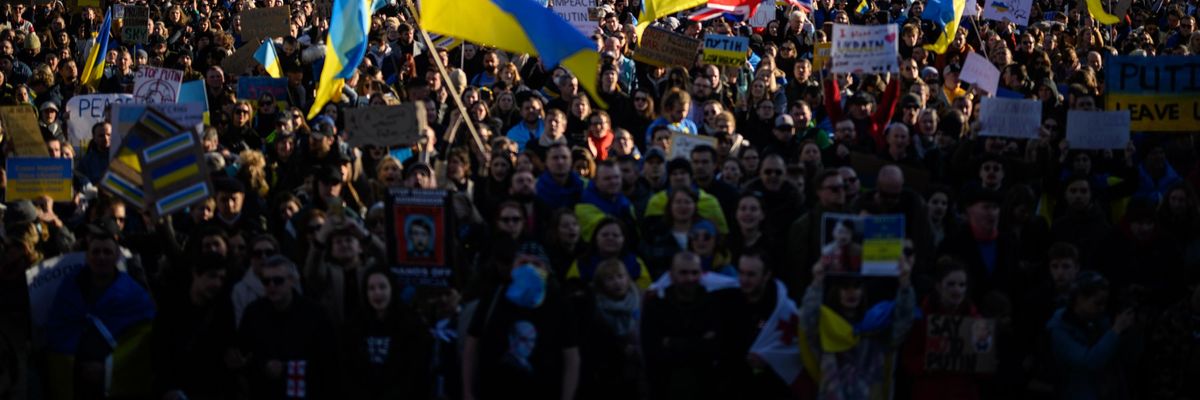The attack on Ukraine focuses the mind on a most critical question for humanity: In our fast-changing world, what is democracy's future?
Autocracy in all its forms has proven to be fixed on the immediate well-being of the minority in power, with utter disregard to the welfare of the citizenry and a healthy environment.
Certainly, a strong argument can be made that democratic governance is more important than ever as humanity faces at least two unprecedented challenges: the existential threats of the global climate crisis and a global pandemic. Attacks on civil and human rights continue as well--challenges that can only be met with democratic governance.
Why? Autocracy in all its forms has proven to be fixed on the immediate well-being of the minority in power, with utter disregard to the welfare of the citizenry and a healthy environment.
Of course, there are exceptions. China is hardly democratic, yet its per capita contribution to greenhouse gas emissions is less than half that of the United States. This sad fact brings home not the failure of democracy but rather the limits of America's comprised democracy, undercut by the influence of private power--in this case the fossil fuel industry.
Nonetheless, democracy is not just a "good" thing. Only democracy holds the promise of accountability to the whole required to meet these threats. And I would go even further. Beyond our physical survival needs, humans have deep psychological needs--for a sense of agency, meaning, and connection with others in common purpose. If democratic polities are not meeting these needs positively, humans tend to grasp for other, destructive ways to meet them. Too often that means seeking meaning, power, and connection through scapegoating others, entrenching ourselves in groups that amplify our differences.
The frightening truth is that worldwide, the "number of countries moving in an authoritarian direction in 2020 outnumbered those going in a democratic direction," observes Sweden-based Institute for Democracy and Electoral Assistance. "The pandemic has prolonged this existing negative trend into a five-year stretch...the longest such period since the start of the third wave of democratization in the 1970s."
And make no mistake: the United States is included among the backsliders.
So, what does our struggle with democracy at home have to do with Russia's violent invasion of Ukraine? Democracy's erosion, of which we are part, no doubt gives autocrats greater confidence that they won't be stopped.
But note well: Hope has power. Science tells us that hope organizes our brains toward solutions. It emboldens us to take even risky action.
And how do we stoke the power of hope?
By taking action. For how can we believe the world could change--for the better--if we don't experience ourselves changing? And how do we change ourselves? By stepping up to protect our communities and our deepest values.
Ukraine is itself a "fledgling democracy, with significant growing pains, largely the result of Russian pressure and interference in its affairs. It is certainly not a tyranny," opines Washington Post's Glenn Kessler. Note that it ranks above Mexico, for example, as well as Georgia, Armenia, and Bosnia and Herzegovina in Freedom House scores of democracy.
Living in a flawed, yet growing democracy, the Ukrainian people have had a taste of how democracy can meet their needs. Surely, this explains why they are mounting such strong resistance against a brutal Russian assault.
They are not fighting only for their homeland, but for the hope and promises that only democracy can offer.
How can we Americans be most helpful?
Certainly, by making Russia pay an untenable price for its aggression but also by strengthening our own democracy. As we do so, we will have the resolve to stand up to dictators, address the climate crisis, squash the pandemic, and solve the other crucial problems of our time.
Unlike Putin's threat, many of the troubles before us do not have a face. They are not as easily identified but they are oh-so important. We risk allowing our own democracy to slowly descend into darkness if we turn a blind eye to these issues.
Fortunately, a citizens' movement for democracy is growing in the United States: Citizens in every state are stepping up to protect and extend voting rights, remove the power of money in politics, and create fair districting so that we each have an equal voice. With the broad network Democracy Initiative, we at the Small Planet Institute are working to make it easy for all Americans to be inspired and participate. So, together we created a meeting ground on the web--www.DemocracyMovement.US--where citizens can discover how they can push forward democracy reforms nationally and in their state.
Whether it is a brutal dictator or the climate crisis that has our attention, only with a democracy do we feel empowered to confront the problems of our time.
Let the tragedy in Ukraine be democracy's call to all of us worldwide that now is the time to stand together as brothers and sisters-in-democracy. When we do so, no problem is too daunting for us to solve.
